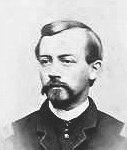 Open main menu
Open main menu
 Open main menu
Open main menu

CAMP NEAR SHARPSBURG, MARYLAND
September 21, l862.
Lieutenant-Colonel GEORGE W. GETTY,
Chief of Artillery, Burnside's Army.
SIR : I have the honor respectfully to make the following report of the part Battery A, Fifth Artillery took in the engagement of September 17, 1862.
On the morning of September 17, 1862, by your orders, I put my battery in position on the crest of a hill on the east side of the Antietam Creek, and some 400 or 500 yards from its bank, for the purpose of assisting in covering the crossing of a portion of the troops, comprising the left wing of our Army. In obedience to orders received from you, I immediately opened fire upon the woods to the right and left of the bridge, for the purpose of dislodging the enemy.
After I had kept up a continuous fire some two hours, our infantry (that up to that time had been stationed in the woods to my right) advanced. When within about fifty yards of the road running along the bank of the stream, they were met by a steady fire from the enemy.
I again opened upon the woods with shell and spherical case, directing my fire entirely upon those points around the bridge, in which I supposed the enemy to be concealed. I had not done so long before I discovered them leaving the woods and crossing the fields beyond. The enemy now opened upon me with rifled guns, but at such long range that I deemed it useless to reply. My attention was then called to a column of the enemy's troops, advancing in the direction of the bridge from a road some distance to my left. The continued to approach until they were hidden from view by a cornfield on my left. I threw solid shot into this field for the purpose of dislodging them. That I did not succeed, the events of the letter portion of the day fully proved.
I feared to use any other kind of projectile as our troops at this time were moving over the bridge.
My firing while at the bridge, with a very few exceptions, was directed entirely at the enemy's troops; the projectiles used were shell, solid shot, and spherical case, the range between 400 and 500 yards. The shell fired, owing to some defect, I found to be of little service In many cases they burst, some at, others not more than fifty yards from the piece. I experienced no difficulty with my spherical case. Having expended most of my ammunition, with the exception of canister, I sent my caissons to the rear to be filled.
About 3 o'clock p.m. of the same day, I again received orders from you to cross the bridge with the battery and report to General Cox, commanding the Ninth Army Corps. He directed me to report for orders to General Rodman, in command of the Third Division of his Corps. I found him at the front and was ordered to bring up the battery and open upon a brigade of the enemy that had already outflanked us on the left. When I reached the ground, the enemy had already compelled our forces to fall back and were within some 600 yards of the battery.
I came into position and opened upon them with spherical case and shell. At this time two of our rifled batteries upon my left retired from the field. I held my position until I found that I was without a singe man to support the battery and the enemy within 100 yards of the guns. I then changed ground to the rear and left. I had no sooner done this than two rifled batteries, one on my left and the other on my front, opened upon me. The forces of the enemy showing themselves on my left flank, I directed a section of the battery against them. Here I again found that the infantry support that had been promised me had not arrived. Feeling that, without support, the position I held would either result in the capture of the battery by the forces of the enemy on my left flank, or in being entirely disabled by the fire of the enemy's guns, I retired from the field. I then, by your orders, again occupied my old position upon the hill commanding the bridge.
My officers, Second Lieutenant George Washington Crabb and Second Lieutenant Albert M. Murray, did their duty in the best manner, and the conduct of the men could not have been excelled. With this report will be found a statement of casualties to men and horses, and the amount and kind of ammunition used.
I am, Sir, very respectfully, your obedient servant,
CHARLES P. MUHLENBERG,
First Lieutenant, Fifth Artillery,
Commanding Battery A.
Source: Janet Hewett, ed., The Supplement to the Official Records of the Union and Confederate Armies, 100 Volumes in 3 Parts, Wilmington (NC): Broadfoot Publishing Company, 1994-2001; Part 1, Vol. 3, pp. 531 - 533. From the Henry Jackson Hunt Papers, Library of Congress.